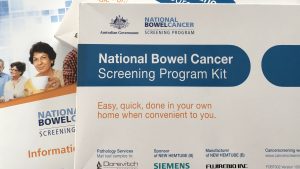 Patients with colorectal cancer diagnosed through participation in the National Bowel Cancer Screening Program (NBCSP) have better postoperative outcomes than patients with cancers diagnosed in other ways.
Patients with colorectal cancer diagnosed through participation in the National Bowel Cancer Screening Program (NBCSP) have better postoperative outcomes than patients with cancers diagnosed in other ways.
Australian data collected in the Binational Colorectal Cancer Audit from 15,630 patients between 2007 and 2018 showed those identified by the NBCSP were typically younger (64 v 69 years) and were at a lower overall health risk according to American Society of Anaesthesiologists (ASA) scores.
NBCSP-identified cancer patients were also more likely to present for elective surgery (96% v 85%), and to have minimally invasive surgery (80% v 66%) than other patients.
Importantly they were also likely to have less advanced disease (stages 0–II: 69% v 63%).
However data from a subset of 11, 366 patients showed that, after adjustment for these factors, NBCSP-identified patients had fewer surgical and medical complications (OR 0.83 and 0.75 respectively) than other patients.
Postoperative surgical complications considered included anastomotic leaks, fistulas, ileus, bowel obstruction and wound infections while postoperative medical outcomes reported by participating surgeons included chest infections, cardiac events and DVTs.
NBCSP-identified patients also had a shorter length of stay in hospital (7.27 v 9.62 days) than other patients.
However postoperative mortality and return to theatre rates were similar regardless of the pathway by which the cancer was detected.
In a letter to the MJA, the investigators said their data supports other evidence of benefits from the NBCSP, including lower mortality and earlier stage of disease.
“Our analysis of BCCA data indicates that, in addition to the lower long term mortality associated with the NBCSP, short term postoperative benefits are also evident that should be taken into account when promoting the program.”
And given the NBCSP participation rate of only about 40%, there was the potential for more people to benefit.
“Our study reinforces calls to improve participation rates in the national screening program by eligible participants to optimise the value of this critically important initiative.”
Senior investigator Professor Susannah Ahern, Head of the Registry Science and Research Program at Monash University, told the limbic that the long-term survival benefit had been the most important indicator available to date on the success of the screening program.
”We were able to look at other outcomes…what has happened is there is a residual benefit, even after adjusting for the factors you would expect to improve the outcome.”
“It does mean that patients could expect a less complicated operative course and a reduction in length of stay by 1.5 days on average.”
“Hopefully it acts as another incentive to get the test done. There are thousands more lives that are not being saved because people are not taking up the screening.”